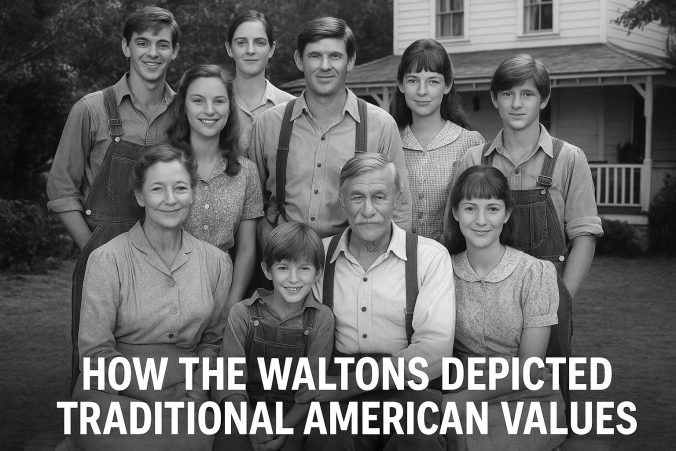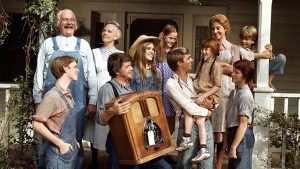Introduction to The Waltons and American Values
The Waltons, a beloved television series, aired on American screens from 1972 to 1981, gaining widespread recognition for its portrayal of traditional American values during the historical periods of the Great Depression and World War II. Set in the bucolic backdrop of rural Virginia, the series delves into the everyday manifestations of the Walton family’s life, offering viewers insights into the cultural and historical norms that defined the era. The series masterfully weaves themes such as family unity, hard work, education, and community—elements that were considered to epitomize American values during this epoch.
Family Unity
A cornerstone of The Waltons is the theme of family unity. The narrative centers around a large, multigenerational family living under a single roof, reflecting a lifestyle that naturally presents various dynamics and interactions integral to understanding the notion of kinship. The Walton family routinely navigates economic hardships, and it is their steadfast unity and unwavering support that underscore the value of familial bonds in navigating manifold adversities. Each episode often punctuates how collective strength rooted in familial love becomes a powerful force, enabling the family to weather the tumultuous challenges of the times, instilling a sense of shared purpose and mutual reliance.
Hard Work and Perseverance
The notion of hard work is intricately interwoven into the tapestry of the series, recurrently surfacing as a significant theme. Owning a mountain farm, the Walton family embodies a committed work ethic, with each member actively engaged in various tasks that contribute to the farm’s sustenance and prosperity. The diverse range of responsibilities showcases their relentless dedication and perseverance. Scenes in which family members labor in unison, whether tending to crops or resolving farm-related issues, serve as potent reminders that diligence and tenacity are instrumental in realizing personal and familial aspirations. This focus on industriousness not only reflects the era’s ethos but also celebrates a universal truth about the importance of work in human life.
Emphasis on Education
The narrative prominently highlights education as an invaluable asset, largely through the eyes of John-Boy Walton, the family’s eldest son and aspiring writer. Despite the economic constraints of the period, the family prioritizes education as a catalyst for personal growth and success. John-Boy’s journey, marked by his intellectual curiosity and literary aspirations, underscores the transformative power of education. The series frequently depicts education as a gateway to personal achievement and enlightenment, advocating the viewpoint that everyone deserves the opportunity to discover and develop their potential. This commitment to education amid economic trials underscores a deeply held belief in the uplifting force of learning.
Community and Neighborliness
The Waltons portrays community and neighborliness as vital components of small-town life, painting a vivid picture of social interconnectedness and mutual support. Throughout the series, numerous storylines reflect how the Waltons, despite their own struggles, extend generosity and support to neighbors in need. This pervasive emphasis on communal solidarity highlights the significance of mutual aid and social responsibility, fostering an understanding of how close-knit communities navigated periods of hardship through collective action and shared resilience. The series champions a philosophy of care and compassion, encouraging viewers to appreciate the lasting impact of community-driven support networks.
Representation of Traditional Gender Roles
The series also offers a glimpse into the traditional gender roles prevalent during its historical setting, reflecting societal norms of the time. John Walton Sr., as the patriarch, assumes the role of the provider, while Olivia Walton, the matriarch, is portrayed as a dedicated homemaker. This delineation of gender roles reflects the era’s norms, providing a backdrop for exploring family relationships and responsibilities. While these traditional roles might appear antiquated by contemporary standards, they serve a valuable narrative purpose, illustrating how families of that time understood and navigated their societal expectations and family dynamics.
The Broader Cultural and Historical Context
The enduring appeal of The Waltons is attributable not only to its compelling storytelling but also to its rich depiction of the broader cultural and historical context in which it is set. The austerity of the Great Depression and the challenges of World War II serve as ever-present backdrops, influencing the lives of the characters and accentuating the values they hold dear. By portraying the resilience and resourcefulness required to endure these challenges, the series connects with the audience on a deep emotional and intellectual level, offering both a mirror to the past and a lens through which to view contemporary challenges.
Contemporary Relevance and Legacy
In conclusion, while The Waltons is an artifact of a bygone era, its depiction of traditional American values continues to resonate with audiences today. The series adeptly weaves these values into its stories, illustrating how themes such as family life, community spirit, and perseverance were instrumental in overcoming adversity during challenging times. Its relevance persists as it encourages viewers to reflect on how these values can be applied in today’s world. The legacy of The Waltons lives on, not just as a nostalgic piece of American television history but as an educational narrative that offers timeless lessons and insights into the human condition. For those interested in exploring the ongoing impact and historical significance of the series, IMDb provides additional resources for deeper understanding and analysis.


